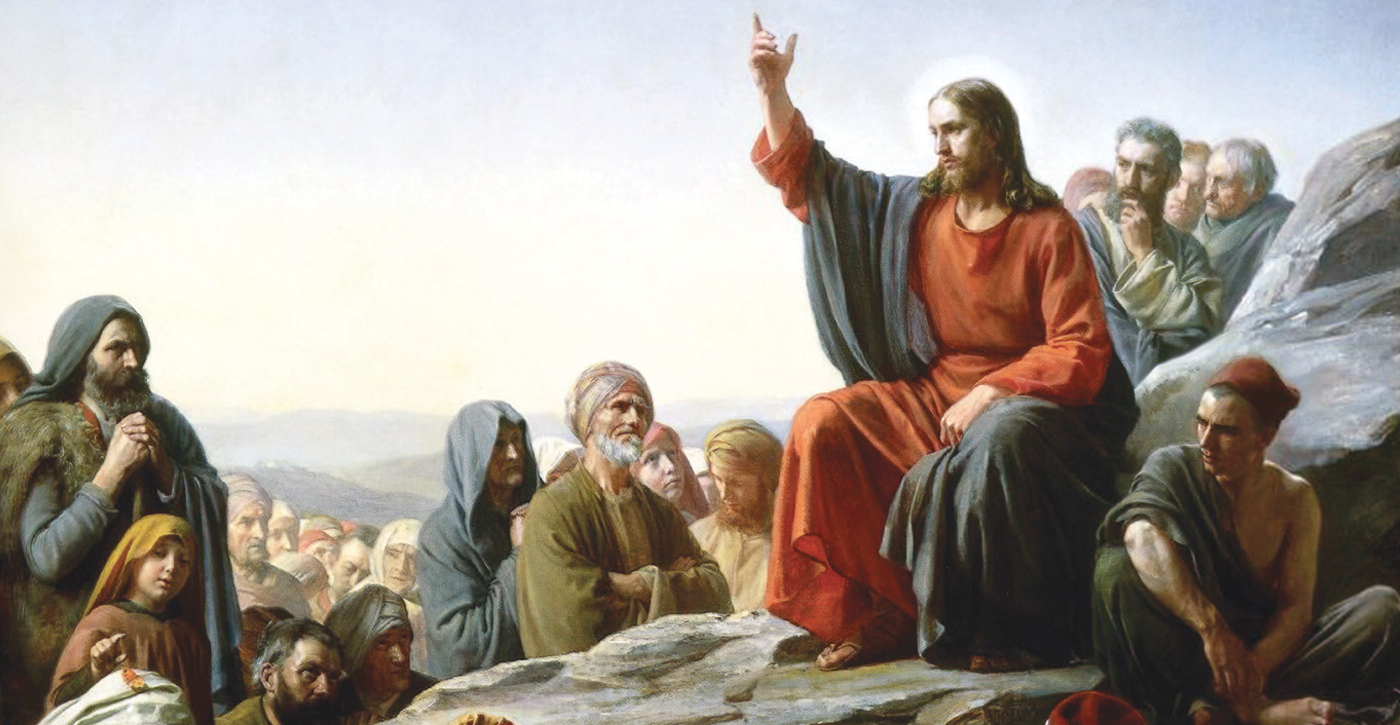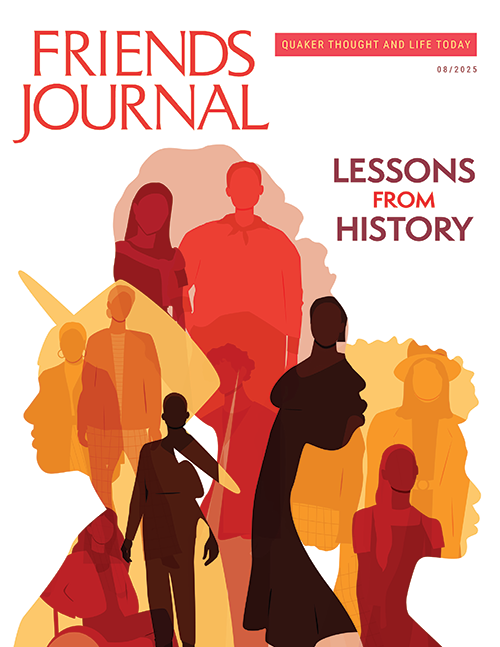New for 2025, the Bible Study column runs four times a year in the February, May, August, and November issues. We welcome your submissions and comments at Friendsjournal.org/bible-study.
Matthew 5:5 (RSV)
This well-known passage is one of the nine Beatitudes, or blessings, recounted by Jesus in the Sermon on the Mount found in Matthew 5. How does the word meek sound to you? Overly submissive? Docile, compliant, or spiritless? That’s what it suggests to me.
There is some virtue in meekness. I think of a piece I once learned in the chorus where I sang. It was based on the short story “Bontshe Shvayg” (“Bontshe the Silent”) by classic Yiddish writer I. L. Peretz about a man called Bontshe, who was meek, very meek. Everyone disrespected him and treated him like someone who didn’t matter in the least. He bore it all with great patience, never responding with anger or lashing out at anyone. When he died, he was taken up to Heaven and told that he could ask for anything he wanted—anything, and it would be given to him. He thought for a while, and then said, “I would like to have every day, for breakfast, a hot roll with fresh butter.” It’s a touching story, and it’s reassuring that he didn’t ask for 50 gold talents, but still, does one really want to be that meek?
Looking back at my childhood, I think I was raised to be meek (although I don’t recall that word being used): do as you’re told; don’t contradict or interrupt your elders; be careful about expressing your opinion. When I grew up and wanted to assert myself more, I probably went too far in the other direction and expressed some opinions that were uncharitable, not to say hurtful. I came to understand that one must find balance. I didn’t find it in time, though, to be an effective parent; speaking with “I really mean it” firmness just didn’t come naturally. My son was sometimes difficult to control, and I struggled to discipline him. When I asked Jean, a Friend from meeting, to take him for one afternoon while I did something else, she reported back that he had tried to run up the side of the dam (it was slanted) and that she had to speak to him “quite severely.” It was hard for me to imagine seemingly mild-mannered Jean speaking severely, but she had successfully raised three children, so she must have known how to do it!
Mary, the mother of Jesus, is often thought of as meek. In the Middle English carol “Lullay, mine liking,” which portrays an encounter with the Nativity scene, angels sing to baby Jesus and Mary: “Blessed be thou, and so be she, that is so meek and mild.”
In Wisdom’s Daughters: Stories of Women around Jesus, Quaker theologian Elizabeth G. Watson presents Mary as a thinking person who has some education, and she points to an empowering definition of the term “virgin” (from feminist scholar Christine Downing): a woman whose “center is in herself.” Watson elaborates: “She is not dependent on men for her identity. We have hints that Mary was such a woman.” Indeed, Mary did wonder why the angel Gabriel would address “someone like me,” but he was convincing, so she said, “Let it be to me as you have said” (Luke 1:38), and found the strength to go forward in spite of the local gossip.
The Message version’s rendering of “Blessed are the meek” is quite different. Jesus says to his hearers: “You’re blessed when you’re content with just who you are—no more, no less. That’s the moment you find yourselves proud owners of everything that can’t be bought.”
What do we long for that can’t be bought? Love, affection, friendship, consideration, positive feelings. I think we all realize that money, power, control, privilege, authority, and impressive achievements do not inspire these emotions, whether we can honestly acknowledge it or not.
A French version of the Bible offers “Blessed are the debonair,” a word that derives from the phrase de bonne aire, literally “of good air.” That seems apt too. To me, the word suggests confident and gracious, that is, confident of God’s love and graciously extending that love to others.
The New English Bible reads: “How blest are those of a gentle spirit; they shall have the earth for their possession.” The term “gentle” is included in The American Heritage Dictionary definition of meek, as well as “showing patience and humility.”
The Interpreter’s Bible from United Methodist Publishing specifies that the Greek word for meek (πραΰς or praus) means not sad resignation but “good will toward men and reverent obedience toward God.” One can be “humble in the strength of reverence,” focused on duties rather than rights, not insisting on one’s place in the sun but being content to walk in God’s shadow. The earth will be inherited by the children of God’s own spirit, and the reward cannot be reckoned in dollars and cents.
When we study the Bible, we choose what has meaning for us; I believe that’s the best way to understand it, rather than just accepting someone else’s interpretation. I like what American theologian Frederick Buechner said about interpretation in his memoir Now and Then:
If you have to choose between words that mean more than what you have experienced and words that mean less, choose the ones that mean less because that way you leave room for your hearers to move around in and for yourself to move around in too.
We need to have confidence that whatever we do in the right spirit will somehow be the right thing.
Discussion Questions
- What does the word meek in Jesus’s blessing mean to you?
- Do you think you are, or might be, a “proud owner of everything that can’t be bought”?
- How is it possible to be “humble in the strength of reverence”? What would that look like?






A very challenging piece to me. I more time to reflect on meekness. Thanks.
I’d like to offer an opportunity. I have been in a Quaker Bible study for 5 years via zoom. I’ve found when Quakers search the “word” deep reflections come out. There is a sense of light that I encourage others to witness and not be afraid of what the world says. I find members offer love, grace and mercy when in discussions. It’s quite remarkable. [email protected]
I have a completely different reading of this passage, though these traditional readings are wonderful. I think that the Beatitudes were Jesus’ commentary on inheritance law in the context of the reign of God he was inaugurating. This verse is explicitly about inheritance and his promise when he declared himself the christ, the messiah, the anointed one, in Luke 4:16-30 and proclaimed the Jubilee, which, among other things, returned families to their inheritance, if they had lost them to foreclosure (Lev 25:10).
In this context, ”meek” means judicially disenfranchised, those who did not own land and therefore could not represent themselves before your village’s assembly of elders if sued. You were “meek.”
Likewise, the Hebrew “eretz” in this passage can mean “earth.” But the word literally means “land,” as in eretz Israel. But in the context of inheritance, it means one’s inheritance, one’s family farm, your land.
So Jesus’ listeners heard this: Blessed are all of you who have lost your land, your farm, your inheritance, because you could not pay your debts, for you shall re-inherit your land, because I have prophetically declared a Jubilee.
But how could Jesus fulfill this promise? The answer is given in Acts 2:43–47 and again in 4:32–37: we will do it for each other. Like Barnabas in Acts 4:36–37, believers with surplus wealth would liquidate some of their assets and give it to the poor. Believers who had lost their inheritance might not be literally returned to their farm, unless the community actually paid off their debt for them; but at least they would not starve.
In Luke 4, Jesus had defined his role as the christ, as the messiah, the anointed one, thus: his mission was to proclaim good news to the poor. The Beatitudes were like planks in the platform of the new “constitution” he was proclaiming. He was proclaiming an economics of redemption—the forgiveness of debts (“forgive us our debts as we forgive our debtors”)—in the common-wealth of God (Acts 4:32, 34).
When two or more souls believe in a mystery, and experience it together, they become the proud owner of all those things that can not be bought. When I was kid, my parents and I believed in Jesus, but we were focused on experiencing him rather than trying to interpret the scriptures. To trust each others experiences rather than to simply obey is what I believe it means to be meek. I really liked the different perspectives brought to this article. Awesome replies too. Thank you for helping me to remember the way things once were in my life, and that my life can be that way again.